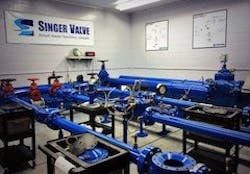The Importance of Hands-On Control Valve Training
If you work in the water industry, you have probably seen your fair share of pipe leaks and bursts and leaking valves. Troubleshooting a valve is not as straightforward as it may sound to some. The problem at hand could be just a minor fix or, in a worst-case scenario, a disaster waiting to happen if not handled properly (and at times immediately). Valve systems are complex pieces of work. It can take hours to get to the root of the problem, and often, we reach out for help from external contractors and experts. Getting external help is fine in most cases, but knowing how to manage the problem until experts arrive can save you a lot of headaches—and water.
Having the knowledge of how a control valve works can be a very beneficial skill for anybody working in the water industry. Knowing how to choose the right valve for various applications can give you a competitive edge if you’re a contractor, engineer or consultant. Even with all of the operator’s manuals, customer service help lines and the wealth of information available online, nothing beats practical knowledge and hands-on experience.
To bridge the practical knowledge gap in the valve industry, Singer offers hands-on training seminars for water industry professionals using its line of control valve products.
• Day one consists of education about valve performance, maintenance, troubleshooting scenarios and general best practices taught by experienced account managers and in-house engineers. Trainees familiarize themselves with valve parts (on a real valve), learn how to assemble and dissemble, and perform a few hands-on training exercises—all in a classroom environment.
• Day two takes place at Singer Valve’s lab facility, which features several full workstations with pipes and valve systems installed. The second day is full of hands-on troubleshooting and training exercises in which attendees work with partners to understand how a control valve works and resolve presented issues taking place at their workstations. Singer Valve engineering experts work with trainees one-on-one and ensure that they fully understand the issue and apply lessons from seminar day one. Singer experts are present at all times to answer any questions (or to control a valve gushing out water).
• At the end of day two, trainees receive a Singer Valve certificate of achievement for successfully completing the automatic control valve application and operation training program.
• CEU credits apply to Singer’s training programs.
This combination of comprehensive valve education and hands-on training prepares trainees for any (small/medium risk) situations involving control valve maintenance and troubleshooting. As Albert Einstein said, “The only source of knowledge is experience.”
If you are interested in registering for Singer Valve’s upcoming seminar in October, please contact your regional Singer Valve sales representative or e-mail [email protected].
